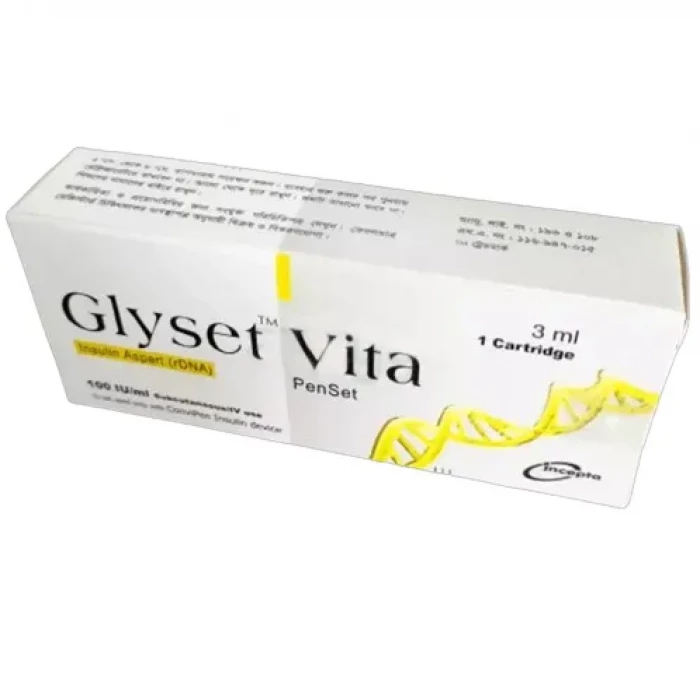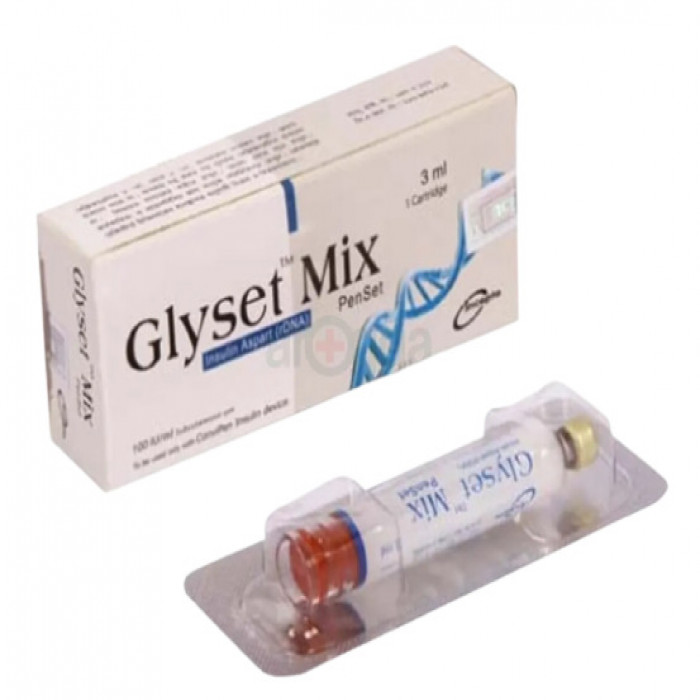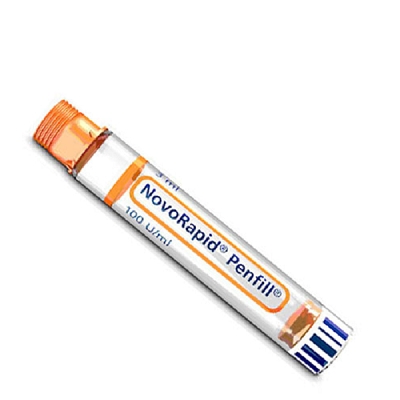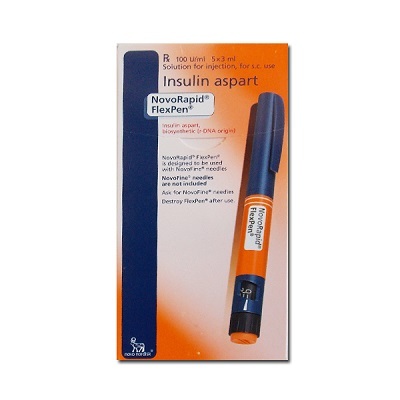
✔ 100% Authentic Product
👁️ Currently Viewing 1746
Glyset Vita Penset 1 Cartridge
Protamine Crystallised Glyset Vita is an insulin analog used to improve glycemic control in patients with diabetes mellitus.
🚚 তাপমাত্রা নিয়ন্ত্রিত ডেলিভারি: এই পণ্যটি গুণগত মান বজায় রাখতে শুধু মাত্র ঢাকা শহরের ভিতরে আইস ব্যাগ এর মাধ্যমে ডেলিভারি করা হয়।
Discount
Price: ৳ 523
MRP:
৳
550
5%
Off

100% Genuine Products, Guaranteed

Safe & Secure Payments, Always

Fast, Secure & Efficient Delivery

Proper Packaging
 Cash on Delivery - All over Bangladesh
Cash on Delivery - All over Bangladesh Regular Delivery - 12-24 Hours, Dhaka City* Charge Tk.39-59
Regular Delivery - 12-24 Hours, Dhaka City* Charge Tk.39-59 Regular Delivery - 24-48 Hours, Other Cities* Charge Tk.99-110
Regular Delivery - 24-48 Hours, Other Cities* Charge Tk.99-110
 ফ্রি ডেলিভারিঃ - ৯৯৯ টাকা+ অর্ডারে, ঢাকা
শহরে
ফ্রি ডেলিভারিঃ - ৯৯৯ টাকা+ অর্ডারে, ঢাকা
শহরে ফ্রি ডেলিভারিঃ - ২৯৯৯ টাকা+ অর্ডারে, ঢাকার
বাহিরে
ফ্রি ডেলিভারিঃ - ২৯৯৯ টাকা+ অর্ডারে, ঢাকার
বাহিরে
100% Genuine Products, Guaranteed
Safe & Secure Payments, Always
Fast, Secure & Efficient Delivery
Proper Packaging
 Cash on Delivery - All over Bangladesh
Cash on Delivery - All over Bangladesh Regular Delivery - 12-24 Hours, Dhaka City* Charge Tk.39-59
Regular Delivery - 12-24 Hours, Dhaka City* Charge Tk.39-59 Regular Delivery - 24-48 Hours, Other Cities* Charge Tk.99-110
Regular Delivery - 24-48 Hours, Other Cities* Charge Tk.99-110 ফ্রি ডেলিভারিঃ - ৯৯৯ টাকা+ অর্ডারে, ঢাকা
শহরে
ফ্রি ডেলিভারিঃ - ৯৯৯ টাকা+ অর্ডারে, ঢাকা
শহরে ফ্রি ডেলিভারিঃ - ২৯৯৯ টাকা+ অর্ডারে, ঢাকার
বাহিরে
ফ্রি ডেলিভারিঃ - ২৯৯৯ টাকা+ অর্ডারে, ঢাকার
বাহিরে
✅ Description:
Glyset Vita rDNA is a sterile, clear solution of a human insulin analog intended for subcutaneous injection/infusion or intravenous injection. It is a blood glucose-lowering agent with a faster onset of action compared to soluble human insulin. Glyset Vita is structurally similar to regular human insulin, except for a substitution of the amino acid Proline with Aspartic acid at position B28, and is produced using recombinant DNA technology.
Safety Advices

Alcohol
UNSAFE
Consumption of alcohol is not recommended during treatment with Glyset Vita due to the increased risk of both hypoglycemia (low blood glucose levels) and hyperglycemia (high blood glucose levels) depending on the quantity and frequency of alcohol consumption. This may cause severe side effects such as dizziness, drowsiness, increased thirst, increased hunger, mood changes, extreme fatigue, etc.

Pregnancy
CONSULT YOUR DOCTOR
Glyset Vita is considered safe for use by pregnant women. However, it must be used only when necessary and the potential benefits outweigh the risks.

Breastfeeding
CONSULT YOUR DOCTOR
The use of Glyset Vita by breastfeeding women is considered acceptable. Breastfeeding women generally require adjustments in doses of insulin

Driving
CAUTION
Glyset Vita may cause symptoms such as weakness, drowsiness, sleepiness, dizziness, inability to concentrate, etc. in some patients. It is advised that you do not perform any activities such as driving a vehicle or operating heavy machinery if you experience any of these symptoms during treatment with this medicine.

Kidney
CONSULT YOUR DOCTOR
Glyset Vita should be used with caution in patients with a history of kidney diseases due to the increased risk of severe adverse effects. Close monitoring of blood glucose levels is recommended for such patients. Appropriate dose adjustments may be necessary based on the patient's clinical condition.

Liver
CONSULT YOUR DOCTOR
Glyset Vita should be used with caution in patients with a history of liver diseases due to the increased risk of severe adverse effects. Close monitoring of blood glucose levels is recommended for such patients. Appropriate dose adjustments may be necessary based on the patient's clinical condition.
✔️ Composition

Each ml of solution contains 100 IU (equivalent to 3.50 mg) of Insulin Aspart (rDNA).
✔️ Uses of Glyset Vita Penset 100 IU/ML
- Diabetes mellitus (Type 1 & Type 2)
✔️ Side Effects of Glyset Vita Penset 100 IU/ML
Possible side effects include hypoglycemia, allergic reactions, injection site reactions, lipodystrophy, itching, and rash.
✔️ How does Glyset Vita Penset 100 IU/MLwork?
It works by increasing the amount of glucose that the tissues absorb and by decreasing the amount of glucose manufactured by the liver.
✔️ Overdose Effects of Glyset Vita Penset 100 IU/ML
A specific overdose for insulin is not defined, but hypoglycemia can develop in stages if an excessive dose is administered. Mild hypoglycemia can be treated with oral glucose or sugary products. Severe hypoglycemia may require glucagon (0.5 to 1 mg) administered intramuscularly or subcutaneously, or intravenous glucose if the patient does not respond to glucagon within 10-15 minutes. After recovery, oral carbohydrates are recommended to prevent relapse.
✔️ Missed Dose of Glyset Vita Penset 100 IU/ML
Since this medicine is taken before meals, it may not follow a strict dosing schedule. If a dose is missed, administer it immediately after the meal. If significant time has passed since the meal, consult your doctor to determine whether to take or skip the missed dose. Do not take an extra dose to make up for the missed one.
✔️ Overdose of Glyset Vita Penset 100 IU/ML
If an overdose is suspected, seek immediate medical attention or contact your doctor. Overdosing may result in hypoglycemia (low blood glucose levels), with symptoms such as extreme weakness, blurred vision, sweating, difficulty speaking, tremors, stomach pain, confusion, etc. In cases of mild hypoglycemia, consuming oral glucose or sugary products can help prevent severe hypoglycemia.
✔️ Pharmacology
The primary action of Insulin Aspart is to regulate glucose metabolism. It binds to insulin receptors on muscle and fat cells, lowering blood glucose by facilitating cellular uptake of glucose and inhibiting glucose production by the liver.
✔️ Dosage of Glyset Vita Penset 100 IU/ML
Insulin Aspart has a quicker onset and shorter duration of action than regular human insulin. It should be administered just before a meal, or, if necessary, soon after a meal. Dosage is individualized based on the patient’s needs as determined by the physician. It is often used in combination with long-acting insulin, given at least once a day. The usual insulin requirement is between 0.5 and 1.0 IU/kg/day for adults and children over 2 years of age, with 50-70% of the dose provided by Insulin Aspart and the remainder by long-acting insulin. Dosage adjustments may be needed if there is increased physical activity or changes in diet. Exercise after a meal can increase the risk of hypoglycemia.
Subcutaneous Injection:
Administer Insulin Aspart via subcutaneous injection in the abdomen, buttocks, thigh, or upper arm. Since it has a more rapid onset and shorter activity duration, it should be injected within 5-10 minutes before a meal.
Continuous Subcutaneous Insulin Infusion (CSII) by External Pump:
Insulin Aspart can be infused subcutaneously using an external insulin pump. The initial pump programming should be based on the total daily insulin dose of the previous regimen, with 50% of the dose administered as meal-related boluses and the remainder as basal infusion. When using an infusion pump, Insulin Aspart should not be mixed with other insulin.
Intravenous Use:
Insulin Aspart may be administered intravenously under medical supervision with close monitoring of blood glucose and potassium levels to prevent hypoglycemia and hypokalemia. For intravenous administration, Insulin Aspart should be used at concentrations from 0.05 IU/mL to 1.0 IU/mL in infusion systems using polypropylene infusion bags. It is stable in infusion fluids like 0.9% sodium chloride.
Take the medicine as directed by a registered physician.
✔️ Administration of Glyset Vita Penset 100 IU/ML
Instructions for injecting Insulin:
- Follow the instructions provided with the ConviPen to insert the cartridge correctly and attach the needle.
- Gently turn the pen upside down 8-10 times until the insulin is uniformly mixed.
- Remove the needle cap and discharge any air bubbles.
- Adjust the dosage to the correct amount and inject at the specific site.
- Avoid cross-contamination by ensuring the needle does not touch anything during preparation.
Take the medicine as directed by a registered physician.
✔️ Interaction
Several drugs affect glucose metabolism and may require dosage adjustments.
- Substances that may reduce insulin requirements: Oral anti-diabetic drugs, ACE inhibitors, disopyramide, fibrates, fluoxetine, monoamine oxidase inhibitors, propoxyphene, pentoxifylline, salicylates, and sulfonamide antibiotics.
- Substances that may increase insulin requirements: Thiazides, glucocorticoids, thyroid hormones, beta-sympathomimetics, growth hormone, and danazol.
- Beta-blockers, clonidine, lithium salts, and alcohol may either enhance or diminish insulin’s glucose-lowering effect.
✔️ Contraindications
If you are allergic to this medicine or any of the ingredients of Glyset Vita Penset 100 IU/ML
✔️ Pregnancy & Lactation
Classified as Pregnancy Category B. There are no restrictions on using Protamine Crystallised Insulin Aspart during lactation. Insulin treatment of the nursing mother is not expected to affect the baby, though dosage adjustments may be necessary.
✔️ Precautions & Warnings
Blood glucose levels should be regularly monitored in all patients treated with insulin. Changes to the Glyset Vita regimen should be made cautiously and under medical supervision.
✔️ Storage:
Store in a refrigerator at 2°C to 8°C. Do not freeze. Protect from light.
⚠️Disclaimer:
At ePharma, we’re committed to providing accurate and accessible health information. However, all content is intended for informational purposes only and should not replace medical advice from a qualified physician. Please consult your healthcare provider for personalized guidance. We aim to support, not substitute, the doctor-patient relationship.









